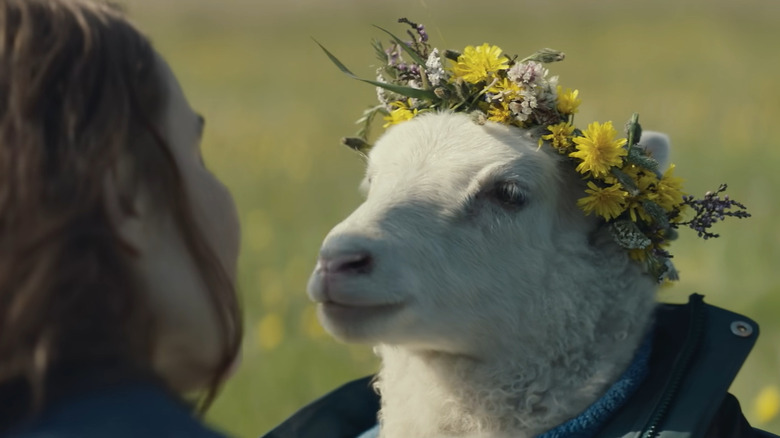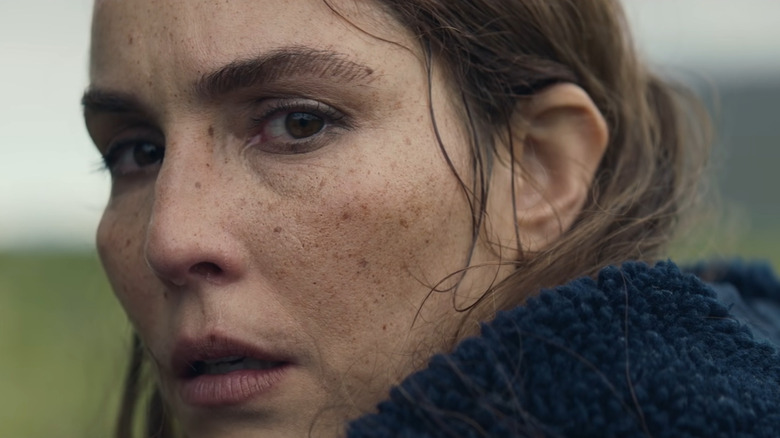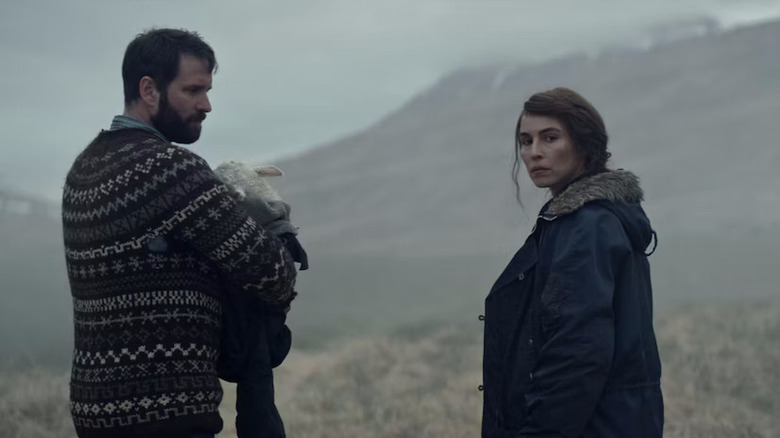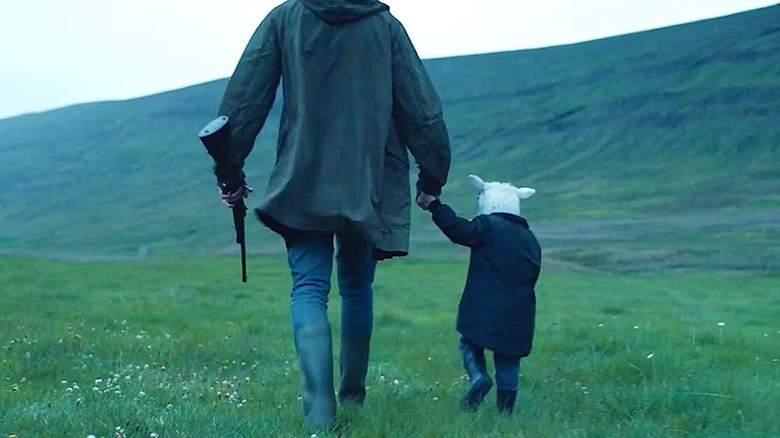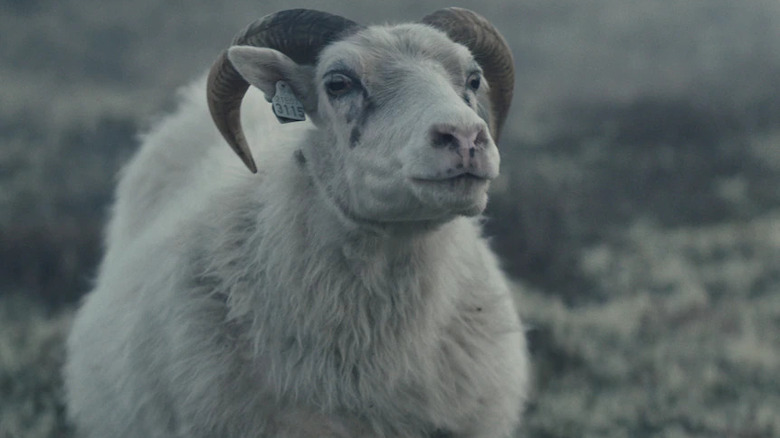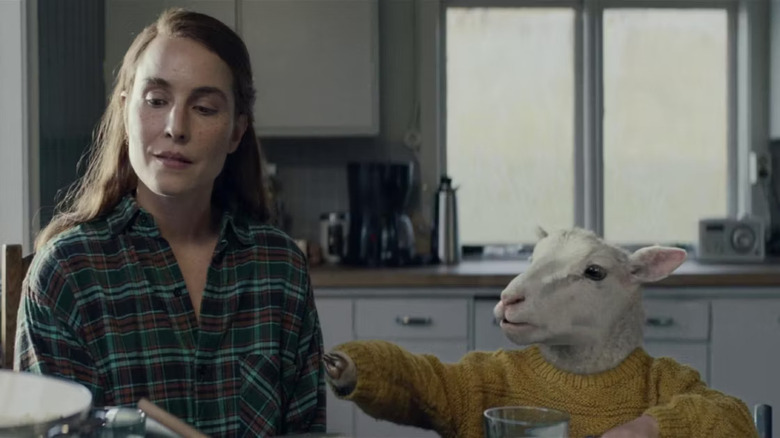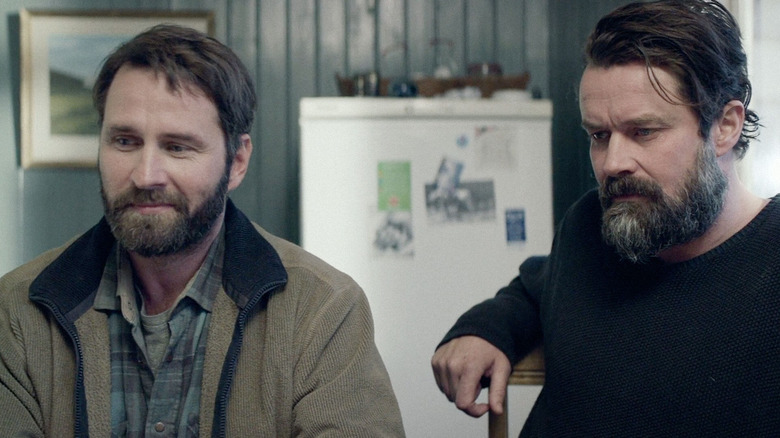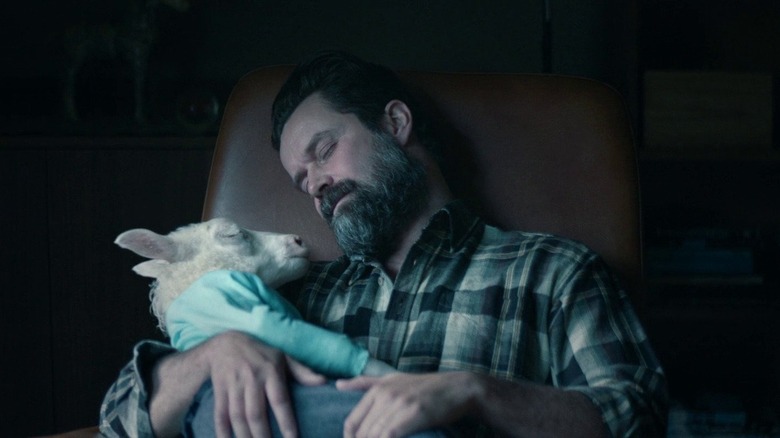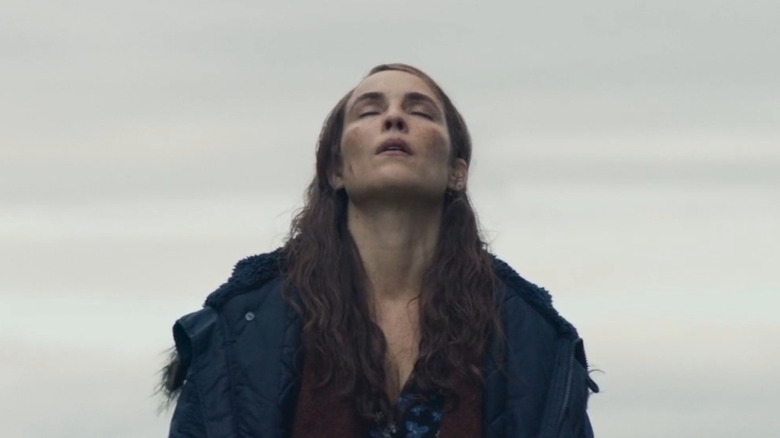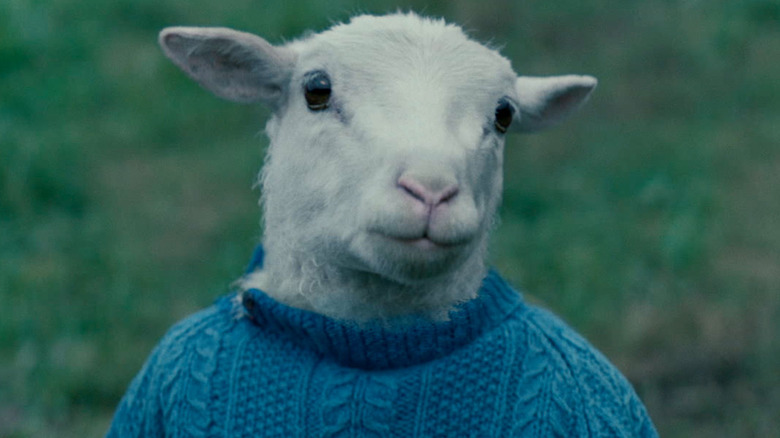Lamb Ending Explained: A Rude Awakening From A Blissful Dream
When "Lamb" released in U.S. theaters in October 2021, a lot of viewers didn't know what to make of it. The trailers implied a horror movie, but the film itself was far more comfortable staying within just an eerie tone throughout its whole runtime. The slow pace never picked up, nor was there any big moment at the end where all the pieces came together in a nice, neat, satisfying conclusion. Mainstream audiences tend to prefer closure, and this movie gave us the opposite of that.
The movie's final moments involve Maria (Noomi Rapace) sending her husband's creepy brother Pétur out of town after he drunkenly attempts to blackmail her into sleeping with him. She returns home as her husband Ingvar (Hilmir Snær Guðnason) is out in the wilderness with Ada, their half-lamb/half-human child. (More on that later.) Maria hears a gunshot in the distance, then runs over to it and finds her husband bleeding out from two gunshot wounds.
The culprit? A strange creature who appears to be half man and half ram. He's shot Ingvar with the hunting rifle he took from their home; as Ingvar bleeds out, the creature takes Ada with him. The implication is reasonably clear: This is Ada's real father, and he's here to take the child back from the humans who probably shouldn't have been raising her in the first place.
What happened at the end of Lamb?
Maria herself never really sees what happened; by the time she finds her husband bleeding out alone, the creature and Ada are long gone. Maria cries as her husband dies in her arms, and expresses a ton of reasonable terror and confusion over what's just happened. But then things gets a little less straightforward: She calms down suddenly and starts looking around. Twice she looks right at the camera, as if she can somehow see us. We get a shot of the couple's dog lying in the field, recently mauled by The Ram Man. (Yes, that's what we're calling him.) The way the two images are cut together imply that Maria's seeing the dog in the field, but that doesn't seem literally possible.
At the end we find Maria standing alone in a muddy, foggy area, no longer actively panicking but just looking dazed, tired and confused. She lets out a gasp, one that sounds and looks surprisingly similar to her gasp during her sex scene with Ingvar 30 minutes earlier in the film. With that note, the movie ends, leaving the audience to find their own meaning in the events we've just witnessed. Why does Maria react this way? Why does The Ram Man murder Ingvar? What was the purpose of the brother Pétur, outside of giving us an explanation for why Maria was separated from Ingvar during his death? Maybe most importantly, what are we supposed to take away from their relationship with Ada, the character the whole story revolves around?
Trying to give any concrete explanations to the events of an intentionally ambiguous, metaphor-driven film is a bit of fool's errand, but if you're looking for some potential answers, we've got a few for you to take into consideration...
'Something about folk tales, I think'
The prevailing feeling behind "Lamb" is that of vague, steadily-growing dread. As soon as the couple takes Ada into their home, the movie emits this constant gnawing sensation that what they're doing with Ada is wrong, not just in a moral sense but in a cosmic one. They're meddling with something they don't understand, and the universe is almost certainly going to punish them for it.
The dread first grows blatant with the constant bleating and loitering from Ada's mother, the sheep that Maria and Ingvar callously take Ada from as a newborn. There's a scene where the couple are watching TV while the sheep bleats outside, and although they both try to ignore her, it's clear she's getting to them. "What did he say?" Maria says at one point, about one of the characters on the show. "Don't know," Ingvar responds. "Missed it. Something about folk tales, I think."
The two are so focused on embracing this new life with Ada that they miss all the signs that could threaten their delusion. This is a story clearly rooted in folk tales, after all, but when the TV says something about folk tales, the message — whatever it was — flies right past them. In a way, it's a similar premise to "Mulholland Drive," in which the main character embraces a dream-like wish fulfillment world, ignoring the growing signs that something is deeply wrong, that this is all a delusion. The characters in "Lamb" aren't literally dreaming, but they sure are ignoring the reality of their situation. The chief of which being that as much as they want to have their deceased daughter back, they can't just force in a replacement for the role when it's clearly not a fit.
An eye for an eye
Why doesn't Ada make for a good replacement child? Well, for one thing, she's already got herself a mother who clearly wants to keep her. For Maria, the bleating of Ada's real mother threatens her delusion about her new child, so Maria grabs their rifle from their shed and shoots her dead. Neither Ingvar or Ada witnesses the event, but this is a folk tale after all, so we know there are going to be some karmic repercussions down the line.
The movie plays around with this knowledge when Pétur tries to kill Ada not long afterward. Him picking up the shotgun is filmed with almost the exact same framing as Maria picking it up, and when he walks Ada to her death, he's holding her hand just as Maria dragged the mother sheep's corpse. If Pétur had killed Ada here, it would've worked as a dark but poetic reversal of Maria's actions; just as she and Ingvar had dragged a child away from her parent and permanently forbid them from seeing each other, Pétur's doing the same thing back to them.
Pétur can't go through with the murder, but the rule of Chekhov's Gun has been established. The image of The Ram Man holding the rifle at the end is a little ridiculous, sure, but it works because the movie has given us all the pieces already. We know about the gun, we know there's a mysteriously otherworldly being who's been stalking the family, and we know this story can't end without Maria and Ingvar suffering some sort of violent repercussion for what they've done. When the creature takes Maria's child and kills someone she loves, he is essentially doing to her exactly what she did to him.
Why killing Ada's mom is so unforgivable
One might argue Maria's punishment at the end is disproportionate to the crime. Domesticated animals are separated from their family on a regular basis, and Ada's mom would hardly be the first livestock animal to be unnecessarily killed. But the reason the act weighs so heavily on Maria, and part of why she treats the events of that final act with a sense of resignation, is because she understands exactly how the poor sheep feels.
As is implied in little bits throughout the movie, and confirmed outright with the gravestone Maria kneels next to, the couple has had a child before. They've had a child named Ada who was ripped away from them, lost in the wilderness to some unspecified fate. For them to know how that feels and still condemn another being to experience that same grief and confusion, even if the being in question is "only" a sheep, is especially cruel.
A running motif throughout the movie is the lingering shots on the animals in Maria and Ingvar's life. We get these constant takes of their cat observing their behavior, of their dog following them around, close-ups of the sheep's knowing eyes for uncomfortably long periods. It all underlines the idea that, although none of these animals are humans, they're all certainly sentient beings. They have feelings and opinions, even if they can't express them clearly. It makes Maria and Ingvar's passive lack of interest in these animals — displayed perhaps most clearly when they're clipping the young lambs' ears, a violent-yet-routine practice that the animals themselves have no way of understanding — feel particularly damning. By real world standards, Maria and Ingvar never break any laws in this movie, but "Lamb" isn't operating under real-world logic.
Embracing Ada
When it comes to Ada herself, each of the three main human characters take a different route to accepting her. For Maria, the acceptance is immediate; she sees her opportunity to raise a child again and she takes it without flinching. For Ingvar, it takes a while longer. He initially seems to go along with it for his wife's sake, but it's clear through his breakdown alone in the tractor that he's not fully on-board.
As he said in the couple's early conversation about time travel, he'd been mostly happy for his life to stay as it was. Whereas Maria was longing for a change, with her talk of going back in time, Ingvar wasn't immediately ready for this new shift in his status quo. And much like Pétur, he's also at least partially aware of how unnatural and impractical it is for them to be raising a half-lamb creature like it's their own human child. It's only when Ada briefly goes missing (in almost the exact same way the previous child went missing, no less) that his full paternal instincts are unlocked, and he's able to love this new Ada as much as Maria does. In more cynical terms, it's only here that he's finally willing to embrace Maria's delusion.
For Pétur, he's only able to accept Ada after pointing a gun directly at her face. Does he change his mind on Ada just because he knows killing her would ruin his chances with Maria, or does he do it out of a genuine newfound love for her as a person? It sure seems to be more of the latter, but giving Pétur's actions in the final act, we sure wouldn't put the former past him.
Just how much of a creep is Pétur?
If you go into fan discussions about this movie, you'll find a common theory that the original, human Ada was actually Pétur's child, not Ingvar's. The theory is that years ago Maria had an affair with Pétur, Ingvar knew about it but forgave her for it, and still chose to raise the child as his own before her untimely death. It's well thought-out but I don't agree with it, mainly because of Ingvar's complete and utter lack of insecurity around the issue. He leaves Pétur and Maria alone together constantly throughout the film, and never once do we get any hint that he has any concerns over what might happen in his absence. Maybe there was an affair at some previous point, but if it did, it seems unlikely Ingvar ever found about it.
One thing is clear though: Pétur has been making advances towards Maria for a long time before the movie starts. She shuts down his attempts each time, but she's never surprised by what he's doing. Even when he stoops to a new low, using his knowledge of Maria murdering Ada's mom to blackmail her into sleeping with him, she handles his rape attempt with an ease that implies familiarity with his tactics. Maybe there wasn't a lamb-human hybrid involved last time, but Pétur has definitely tried a trick like this with her before.
Why Pétur's here
Pétur's main purpose in the film might just be to threaten Maria's dream of happily getting to raise her new child. Maria's delusion of Ada as a fresh start is threatened constantly throughout the movie — first by her husband's inability to fully embrace Ada, then by the sheep's constant bleating, then by Pétur. First he threatens her dream by refusing to see Ada as a child instead of an animal. Then he threatens her dream by trying to ruin her marriage.
There's only really one period in the whole movie where that feeling of dread subsides, where nobody is threatening to ruin Maria's happy life with her new child, and that's the few short scenes after Pétur decides not to kill Ada. For a brief period, Pétur and Ada are getting along, the Ram Man seems to be taking the day off from stalking them, and Maria and Ingvar finally get to have sex after a whole movie of lamb-related stress. The camera stays on Maria throughout the whole sex scene, only cutting away right after she looks up and gasps.
It's not quite the same gasp she gives at the very end, but it sounds and is filmed similarly enough to feel like an intentional parallel. Maybe that gasp at the end serves to emphasize just how bad things had spiraled since the last time she gasped, or maybe both moments are meant to signal that Maria is waking up from her dream, if even just for a moment. All we know for sure is that the first gasp is immediately followed by the tractor breaking down, which begins the chain of events that lead to Pétur, Ingvar, and Ada all being removed from Maria's life.
What Lamb star Noomi Rapace had to say about the ending
"I think [Maria] always thought that Ada wouldn't stay," Maria actor Noomi Rapace said at a Q&A around the time of the film's release. "When we meet her, she's not living. She's surviving. When Ada is born, it becomes a gift... She knows [Ada will] only be there for as long as she needs. She somehow always knew the Ram Man [was there] and that Ada will be taken away from her." Rapace clarified that she doesn't see The Ram Man as particularly evil, explaining his actions through the lens of what her grandmother taught her as a child:
"My grandma always said, 'Don't provoke the elves.' We have to be respectful to all creatures, even ones we don't see. I was always aware of things that are not there. And if you cross that line and take something that is not yours to have, nature will hit back. They will avenge you and come after you."
Rapace argued that Maria always knew on some level that her time with Ada would come to end, and that she wouldn't really have anyone to blame for it. Maybe it's why Maria looks directly at the camera after Ingvar's death, giving us a look that seems like guilt. It's like she knows we know about what she did to Ada's mother, that she knows as well as we do that there is something poetic about this outcome, as harsh as it is.
""It's almost like a love story or summer fling. You know it's going to be over when fall comes," Rapace concluded. "That's why at the end, she doesn't come after the Ram Man. She doesn't run to find Ada. She knows this was supposed to be. She is back alive and awake."
As for Ada herself...
As much as this movie can be read as a grief-ridden Maria trying to cling to the comforting delusion of a second chance with her first daughter, it's all a little complicated by Ada herself. Like an animal, she can't really talk like a human, and she eats grass when Pétur mockingly feeds it to her. Like a human, she walks on two feet and gains a strong understanding of the world around her.
As much as Ada might not belong with these humans, her final morning with Ingvar is perhaps the best argument in favor of her staying: She's able to follow Ingvar's polite directions far better than any animal could, and when The Ram Man comes to take her away, she'd much rather stay with Ingvar. As proportionate as Maria's fate at the end might seem from her perspective, all Ada knows is that she's being taken away from the people who've raised her for all her conscious life.
For Maria, this might be a "summer fling" of sorts, as Rapace speculated, but for Ada this is the end of her whole world so far. She's never properly met her real father before this moment, and in the little glimpses she's gotten of him before now she's always seemed terrified. If "Lamb" is a movie about the inherent self-destruction behind Maria's desire to give motherhood another try with a child that's not her own, it's still a movie that's deeply sympathetic to both mother and child. Maria's dream might crumble under the persistent weight of outside forces, but as we watch Ada cling to Ingvar's hand and Maria stand silently alone in the foggy wilderness, it's hard to blame her for clinging to the dream for so long.
